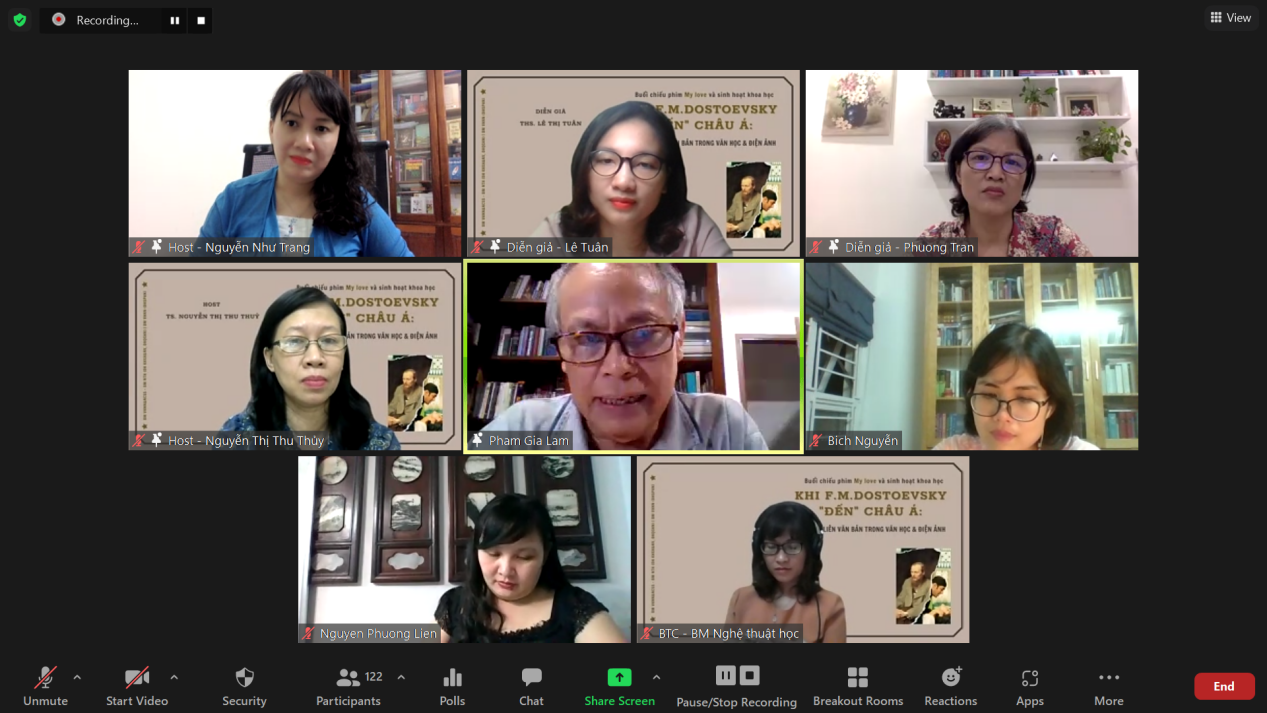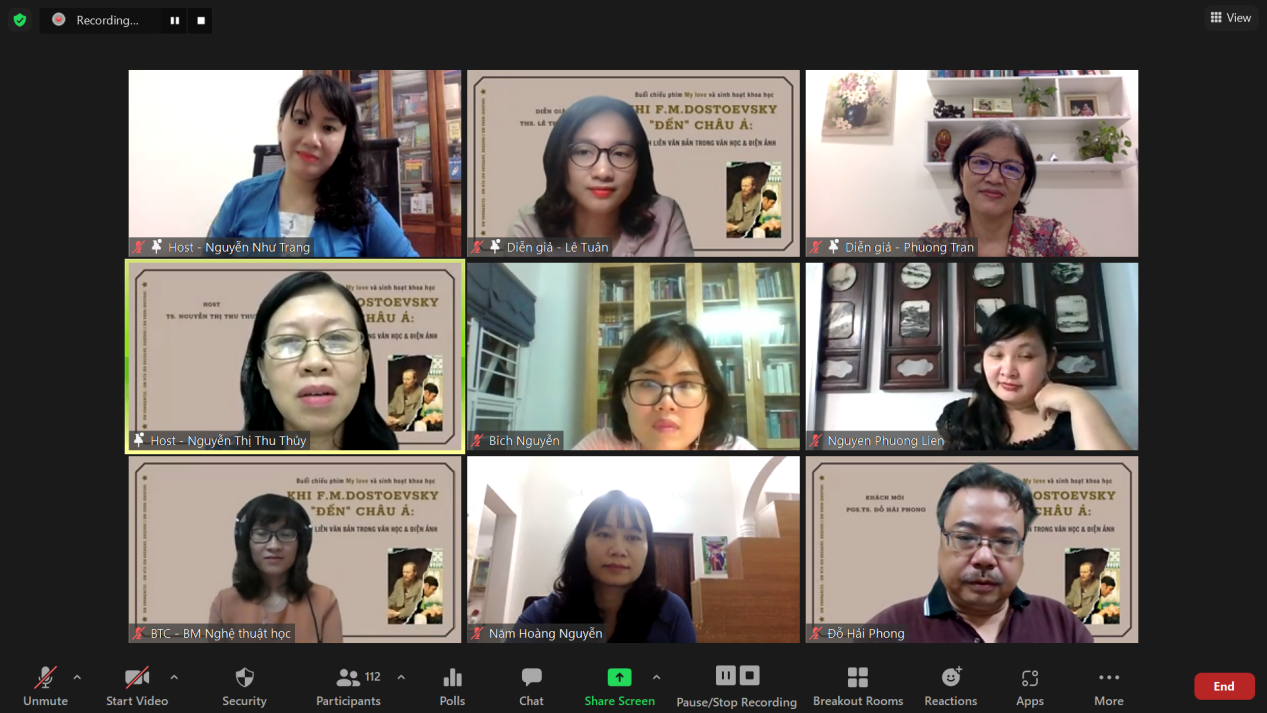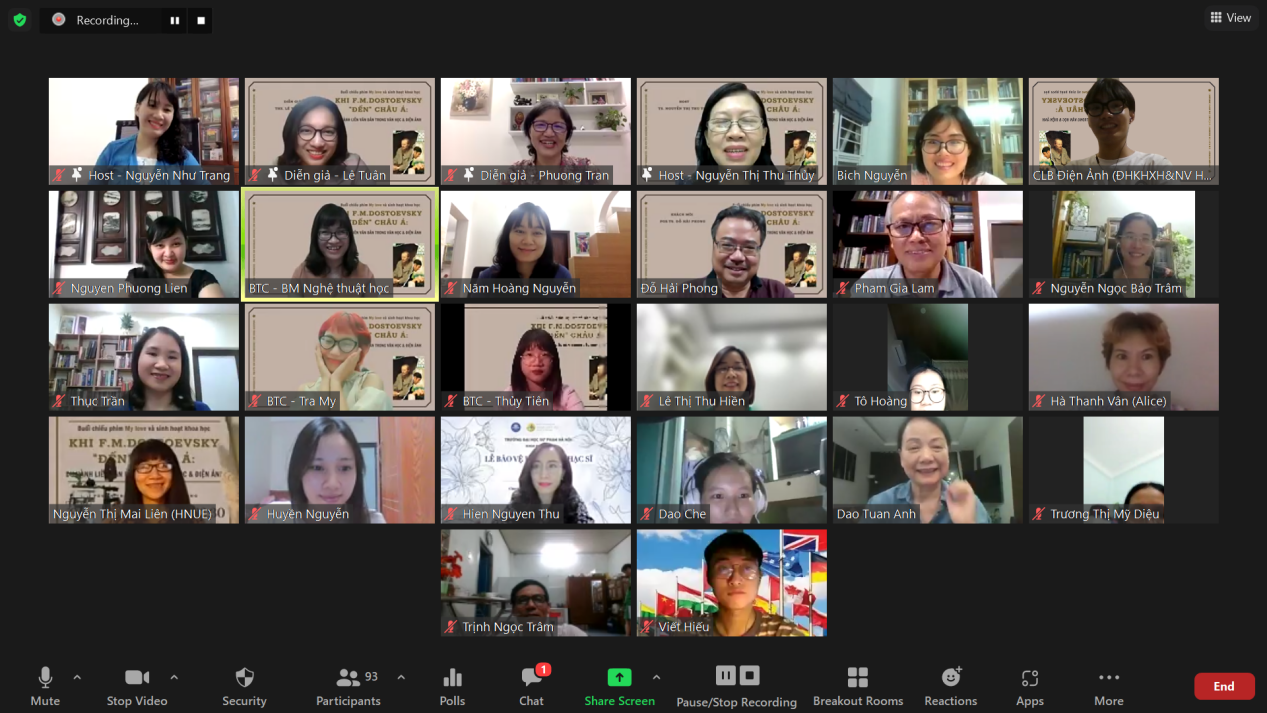The influence of the writer F.M. Dostoevsky on art in general and our lives in particular remains evident today. His works not only raise universal philosophical, ethical, and spiritual issues, but also open up new intertextual avenues. Therefore, combining the issues raised by Dostoevsky with the intertextualities arising from his works can open up a new aspect in the reception of Dostoevsky's legacy. Especially in the context of globalization, examining how each director and writer from different countries, cultures, and religions receives Dostoevsky can provide us with a new perspective on the issues of our time.
As part of the activities commemorating the 200th anniversary of Dostoevsky's birth, the screening of the film "My Love" and the scientific seminar "When Dostoevsky 'Comes' to Asia: Intertextual Travel in Literature and Cinema" aimed to introduce an aspect of the reception of Dostoevsky's legacy in Asia – the continued vitality of Dostoevsky's ideas in new textual forms, new lives, and new lands outside his homeland.
Speaking at the event, Associate Professor Pham Xuan Thach, Head of the Faculty of Literature, Hanoi University of Social Sciences and Humanities, stated: “We are honored to organize this special event to contribute to a deeper understanding of Dostoevsky's values and his imprint on literary life in particular and on artistic life in general. In contemporary life, we see that Dostoevsky still lives in the hearts of the Vietnamese people, continuing to have a unique influence and reception.”
Attending the event, VVStepanov, Director of the Russian Science and Culture Center in Hanoi, particularly appreciated the significance of this activity: “The activities of Hanoi National University and the University of Social Sciences and Humanities in particular contribute to developing mutual understanding, friendship, and cooperation between Vietnam and Russia.”
The film My Love, screened at the event, is an adaptation of F. Dostoevsky's novel *White Nights*. During the panel discussion, speakers and guests discussed the potential for adaptation of the novel, changes made during the film adaptation process, and the cinematic language of the film.
According to Ms. Le Thi Tuan (Faculty of Literature, Hanoi University of Social Sciences and Humanities) – a speaker at the event, “White Nights is Dostoevsky’s most adapted novella and short story.” Ms. Tuan explained that the potential for adaptation stems from several aspects: the universality of the theme, the problematic character types, the coherence of events in a simple plot, and the open, unconstrained nature of the subject matter. Therefore, “Dostoevsky’s stories can be relevant to any era, any culture.” The event’s guest speaker, Assoc. Prof. Dr. Pham Gia Lam, added that the potential for adapting Dostoevsky’s works lies in the feminine nature of the Russian soul in his writings. “People need to be loved, need to be understood, need to be shared with. And it is this inherent feminine nature that elevates humanity.”
Discussing the film My Love, the speaker at the event, Associate Professor Dr. Tran Thi Phuong Phuong (Faculty of Literature, University of Social Sciences and Humanities, Ho Chi Minh City), stated that besides successfully building a love story full of emotional nuances, the Indian film also recreates the dreamer character, which is very famous in Dostoevsky's works: “The dreamer character appeared in Dostoevsky's works in the 1940s. This is a prominent character type in Dostoevsky's era: characters who yearn for action, yearn for life, but are also weak and meek. This is a character of the city in Dostoevsky's time, and at the same time reflects urban issues today.”

The guest speaker at the event, Associate Professor Dr. Dao Tuan Anh, also shared his thoughts on the ethical issues of love raised by the film "My Love" and the short story "White Nights": "Both director Sanjay Leela Bhansali and Dostoevsky placed great emphasis on the ethical aspects of love. And this aspect played a very important role in Dostoevsky's time."

Commenting on the film My Love from an intertextual perspective, the speakers and special guests particularly emphasized the film's global localization. This is a very common trend in art today, the combination of local and international elements "in which there are interminglings that are distinctly local."
Regarding the characteristics of Dostoevsky's reception in Asia, Associate Professor Dr. Do Hai Phong (Faculty of Literature, Hanoi Pedagogical University) believes that the compassionate quality in the Russian writer's works is one of the factors that attracts directors to adapt them. Along with that, the spirit of Buddhism and the humanistic idea of "beauty saving the world" also contribute to Dostoevsky's strong influence. Associate Professor Dr. Do Hai Phong also discusses the influence of Dostoevsky's works on the works of writer Nguyen Huy Thiep.

With the skillful guidance of host Dr. Nguyen Thi Nhu Trang (Faculty of Literature, Hanoi University of Social Sciences and Humanities) and the insightful discussions of the speakers and guests, nearly 300 attendees enjoyed the event for 5 consecutive hours. At the end of the event, many attendees thanked the organizers for holding a "very interesting and meaningful" event.
Dostoevsky's influence extends beyond his era, contributing to his enduring legacy; as Dr. Nguyen Thi Thu Thuy, head of the event organizing committee, stated: "Dostoevsky's intellectual world is vast, and it is always expanding and inspiring further discoveries."


